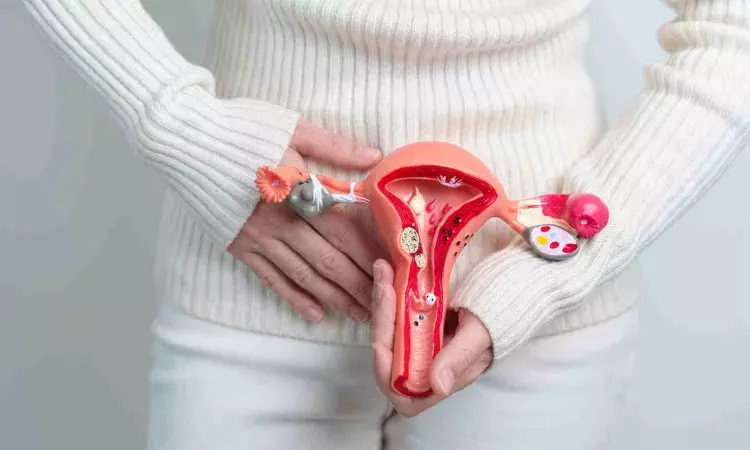- Home
- Medical news & Guidelines
- Anesthesiology
- Cardiology and CTVS
- Critical Care
- Dentistry
- Dermatology
- Diabetes and Endocrinology
- ENT
- Gastroenterology
- Medicine
- Nephrology
- Neurology
- Obstretics-Gynaecology
- Oncology
- Ophthalmology
- Orthopaedics
- Pediatrics-Neonatology
- Psychiatry
- Pulmonology
- Radiology
- Surgery
- Urology
- Laboratory Medicine
- Diet
- Nursing
- Paramedical
- Physiotherapy
- Health news
- Fact Check
- Bone Health Fact Check
- Brain Health Fact Check
- Cancer Related Fact Check
- Child Care Fact Check
- Dental and oral health fact check
- Diabetes and metabolic health fact check
- Diet and Nutrition Fact Check
- Eye and ENT Care Fact Check
- Fitness fact check
- Gut health fact check
- Heart health fact check
- Kidney health fact check
- Medical education fact check
- Men's health fact check
- Respiratory fact check
- Skin and hair care fact check
- Vaccine and Immunization fact check
- Women's health fact check
- AYUSH
- State News
- Andaman and Nicobar Islands
- Andhra Pradesh
- Arunachal Pradesh
- Assam
- Bihar
- Chandigarh
- Chattisgarh
- Dadra and Nagar Haveli
- Daman and Diu
- Delhi
- Goa
- Gujarat
- Haryana
- Himachal Pradesh
- Jammu & Kashmir
- Jharkhand
- Karnataka
- Kerala
- Ladakh
- Lakshadweep
- Madhya Pradesh
- Maharashtra
- Manipur
- Meghalaya
- Mizoram
- Nagaland
- Odisha
- Puducherry
- Punjab
- Rajasthan
- Sikkim
- Tamil Nadu
- Telangana
- Tripura
- Uttar Pradesh
- Uttrakhand
- West Bengal
- Medical Education
- Industry
Long-acting progestogens as effective as oral contraceptive pills for preventing endometriosis-related pain recurrence: BMJ

UK: A groundbreaking clinical trial known as PRE-EMPT, a pragmatic, parallel-group, open-label, randomized controlled trial, has yielded compelling evidence regarding managing endometriosis-related pain. The study, comparing the efficacy of long-acting progestogens to the combined oral contraceptive pill (COCP), offers valuable insights into optimizing treatment strategies for this debilitating condition affecting millions of women worldwide.
The study showed that postoperative prescription of a long-acting progestogen or the combined oral contraceptive pill led to similar levels of improvement in endometriosis-related pain at three years; both groups showed around a 40% improvement compared with preoperative levels.
"While women can be reassured that both options are effective, the reduced risk of repeat surgery for hysterectomy and endometriosis might make long-acting reversible progestogens preferable for some," the researchers wrote in The BMJ.
Endometriosis, a chronic gynecological disorder characterized by the growth of endometrial-like tissue outside the uterus, often leads to debilitating pelvic pain and infertility. While various treatment options exist, including hormonal therapies like progestogens and COCP, their relative effectiveness in preventing the recurrence of endometriosis-related pain has remained a subject of debate.
Against the above background, Kevin G Cooper, professor, Aberdeen Royal Infirmary, NHS Grampian, Aberdeen, UK, and colleagues aimed to compare the clinical effectiveness of long-acting progestogens with the combined oral contraceptive pill in preventing recurrence of endometriosis-related pain.
The study included 405 women of reproductive age undergoing conservative surgery for endometriosis across 34 UK hospitals. Participants were randomized in a 1:1 ratio to a long-acting progestogen (depot medroxyprogesterone acetate or levonorgestrel-releasing intrauterine system; n=205) or the combined oral contraceptive pill (n=200).
The primary outcome was pain measured three years after randomization through the pain domain of the Endometriosis Health Profile 30 (EHP-30) questionnaire. Secondary outcomes, which were evaluated at six months, one, two, and three years, included the four core and six modular domains of the EHP-30, and treatment failure (second-line medical treatment or further therapeutic surgery).
The following were the key findings of the study:
- At three years, there was no difference in pain scores between the groups (adjusted mean difference −0.8), which had improved by around 40% in both groups compared with preoperative values (an average of 24 and 23 points for long-acting progestogen and combined oral contraceptive pill groups, respectively).
- Most of the other domains of the EHP-30 also showed improvement at all time points compared with preoperative scores without evidence of any differences between groups.
- Women randomized to a long-acting progestogen underwent fewer surgical procedures or second-line treatments compared with those randomized to the combined oral contraceptive pill group (73 versus 97; hazard ratio 0.67).
The findings suggest that long-acting progestogens are as effective as COCP in preventing the recurrence of endometriosis-related pain after surgery and may be associated with a reduced need for further procedures.
Reference:
Cooper KG, Bhattacharya S, Daniels JP, Horne AW, Clark TJ, Saridogan E, Cheed V, Pirie D, Melyda M, Monahan M, Roberts TE, Cox E, Stubbs C, Middleton LJ; PRE-EMPT Collaborative Group. Long acting progestogens versus combined oral contraceptive pill for preventing recurrence of endometriosis related pain: the PRE-EMPT pragmatic, parallel group, open label, randomised controlled trial. BMJ. 2024 May 15;385:e079006. doi: 10.1136/bmj-2023-079006. PMID: 38749550; PMCID: PMC11094611.
Dr Kamal Kant Kohli-MBBS, DTCD- a chest specialist with more than 30 years of practice and a flair for writing clinical articles, Dr Kamal Kant Kohli joined Medical Dialogues as a Chief Editor of Medical News. Besides writing articles, as an editor, he proofreads and verifies all the medical content published on Medical Dialogues including those coming from journals, studies,medical conferences,guidelines etc. Email: drkohli@medicaldialogues.in. Contact no. 011-43720751


